Posted on May 17th, 2010 by Jaimie Schock
 President Obama wants American high schools to graduate kids who are college- and career-ready. But, statistics on remedial education indicate that that’s not going to be an easy goal to meet. In 2007-08, a third of first-year college students required at least one remedial education course in either math, science or English.
President Obama wants American high schools to graduate kids who are college- and career-ready. But, statistics on remedial education indicate that that’s not going to be an easy goal to meet. In 2007-08, a third of first-year college students required at least one remedial education course in either math, science or English.
Read More
Filed under: K-12 Education News | Comments Off on Remedial Courses — Or Less College Emphasis?
Tags: Education Policy, Public Policy, Research on Learning
Posted on May 17th, 2010 by Jaimie Schock
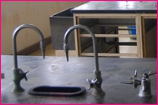 Giving students compelling, hands-on lab exercises is a way to ignite their curiosity and interest and should be commonplace in all American high schools, writes Francis Eberle, executive director of the National Science Teachers Association. Yet, he adds, too many school labs are “dismal at best” and these sub-par facilities are a big reason why students get turned off by science and don’t go on to study it at college.
Giving students compelling, hands-on lab exercises is a way to ignite their curiosity and interest and should be commonplace in all American high schools, writes Francis Eberle, executive director of the National Science Teachers Association. Yet, he adds, too many school labs are “dismal at best” and these sub-par facilities are a big reason why students get turned off by science and don’t go on to study it at college.
Read More
Filed under: K-12 Education News | Comments Off on Dismal School Labs Must Be Upgraded
Tags: Education Policy, Laboratory Experience, National Lab Day
Posted on May 17th, 2010 by ASEE
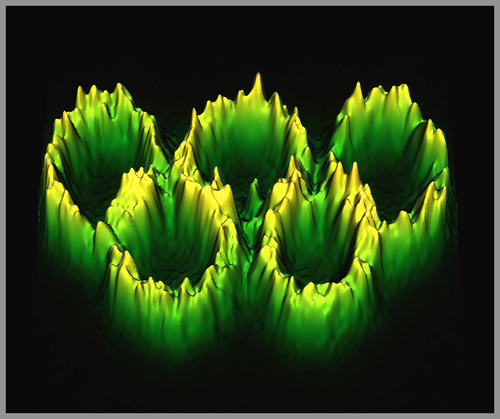
The annual Art of Science exhibition and contest at Princeton University displays images by the school’s undergraduates, faculty, research staff, graduate students, and alumni that explore the interplay between science and art. Each image, produced during the course of scientific and engineering research, is selected for its aesthetic excellence, as well as scientific or technical interest.
Read More
Filed under: Web Resources | Comments Off on Website: The Art of Science
Tags: Art
Posted on May 17th, 2010 by ASEE
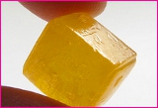 This lesson uses candy as a medium to illustrate the creation of glass, engaging students in three separate experiments as they predict, observe, and record the outcome of varying controls. The lesson is drawn from the curriculum “Contrasts: A Glass Primer,” developed by the Museum of Glass in Takoma, Washington, which aims to help students comprehend the medium of glass, while emphasizing oppositions in its creation, use, and aesthetics.
This lesson uses candy as a medium to illustrate the creation of glass, engaging students in three separate experiments as they predict, observe, and record the outcome of varying controls. The lesson is drawn from the curriculum “Contrasts: A Glass Primer,” developed by the Museum of Glass in Takoma, Washington, which aims to help students comprehend the medium of glass, while emphasizing oppositions in its creation, use, and aesthetics.
Read More
Filed under: Class Activities, Grades 6-8, Grades K-5 | 1 Comment »
Tags: Chemical Engineering, Crystal study, Glass engineering, Manufacturing Engineering
Posted on May 13th, 2010 by ASEE
 Math and science teachers are having a tough time making the transition from traditional teaching methods to more effective inquiry-based learning, a prize-winning elementary school teacher told U.S. senators May 6, appealing for more professional development programs. Susan Naylor, a mathematical instructional coach from Woods County, West Virginia, testified before the Commerce, Science and Transportation Committee.
Math and science teachers are having a tough time making the transition from traditional teaching methods to more effective inquiry-based learning, a prize-winning elementary school teacher told U.S. senators May 6, appealing for more professional development programs. Susan Naylor, a mathematical instructional coach from Woods County, West Virginia, testified before the Commerce, Science and Transportation Committee.
Read More
Filed under: K-12 Education News | Comments Off on Senators Hear Appeal for More Teacher Training
Tags: Education Policy, Public Policy, Teacher Training
Posted on May 12th, 2010 by axb
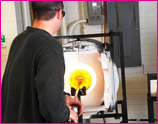 The one-week ASM Materials camp at Missouri University of Science and Technology, July 25-30, 2010, offers rising juniors and seniors an opportunity to explore materials science and engineering principles through a combination of mini-demonstrations, field trips, and group projects. Past projects have included microelectronic circuitry, friction-stir welding, ceramic magnets, metal casting, glass processing, and heat treatment and mechanical property evaluation. Cost: Free. Application Deadline: May 31, 2010. 2011 dates to be announced.
The one-week ASM Materials camp at Missouri University of Science and Technology, July 25-30, 2010, offers rising juniors and seniors an opportunity to explore materials science and engineering principles through a combination of mini-demonstrations, field trips, and group projects. Past projects have included microelectronic circuitry, friction-stir welding, ceramic magnets, metal casting, glass processing, and heat treatment and mechanical property evaluation. Cost: Free. Application Deadline: May 31, 2010. 2011 dates to be announced.
Read More
Filed under: Grades 9-12, K-12 Outreach Programs | Comments Off on Students Summer: Materials Camp. Missouri, July 25-30, 2010
Tags: Grades 11 and 12, Materials Engineering, Summer Camps & Programs (Students), Summer Programs (Students)
Posted on May 11th, 2010 by ASEE
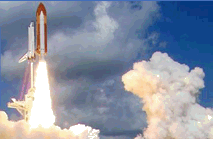
Based on the actual software currently used for training at its Launch Control Center, NASA’s downloadable Kennedy Launch Academy Simulation System Software (KLASS) enables a launch countdown simulation with a networked system of computers. The supporting KLASS Curriculum is a series of STEM lesson plans for students grades 6-10 with interactive resources that build to a simulated shuttle launch.
Read More
Filed under: Web Resources | Comments Off on Web Resource: NASA Simulation Launch Software
Tags: Aerospace, Aerospace Engineering, Grades 6-10, NASA, Science Curriculum, Software
Posted on May 11th, 2010 by ASEE
 Penn State Veterinary and Biomedical Sciences Summer Camp, June 27-July 2, 2010, for grades 11. In this program, students spend time in state-of-the-art laboratories guided by veterinary and biomedical sciences faculty, post-doctoral fellows, and graduate students. They interact with veterinarians, immunologists, and toxicologists, and learn veterinary and biomedical professions through laboratory exercises, lectures, and a tour of a local veterinary practice. Level: 11th grade students. Cost: Program cost: Day-Camp Option price: $405; Residential Option price: $550. Application deadline: June 11, 2010. No new information posted for 2011.
Penn State Veterinary and Biomedical Sciences Summer Camp, June 27-July 2, 2010, for grades 11. In this program, students spend time in state-of-the-art laboratories guided by veterinary and biomedical sciences faculty, post-doctoral fellows, and graduate students. They interact with veterinarians, immunologists, and toxicologists, and learn veterinary and biomedical professions through laboratory exercises, lectures, and a tour of a local veterinary practice. Level: 11th grade students. Cost: Program cost: Day-Camp Option price: $405; Residential Option price: $550. Application deadline: June 11, 2010. No new information posted for 2011.
Read More
Filed under: Grades 9-12, K-12 Outreach Programs | Comments Off on Students Summer: Biomedical & Veterinary Camp, Penn. State, June.
Tags: Biomedical, Grade 11, Summer Camps & Programs (Students), Summer Programs (Students)
Posted on May 10th, 2010 by ASEE
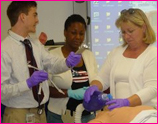 The Aquatic Systems: Emerging Problems and Creative Solutions Institute, University of Florida, July 12-16, 2010, highlights significant research on Florida coastal and inland aquatic systems. Activities include field work and laboratory activities suitable for all classes. The course emphasizes contaminants that affect human and environmental health. Eligibility: Secondary School Science Teachers. Cost: $450. Application Deadline: Not stated, but early registration encouraged. Update to be announced Spring 2011.
The Aquatic Systems: Emerging Problems and Creative Solutions Institute, University of Florida, July 12-16, 2010, highlights significant research on Florida coastal and inland aquatic systems. Activities include field work and laboratory activities suitable for all classes. The course emphasizes contaminants that affect human and environmental health. Eligibility: Secondary School Science Teachers. Cost: $450. Application Deadline: Not stated, but early registration encouraged. Update to be announced Spring 2011.
Read More
Filed under: K-12 Outreach Programs | Comments Off on Teachers’ Summer: Institute on Aquatic Systems. U. Florida, July 12-16, 2010
Tags: Environmental science, Programs for Teachers, Summer Programs (Teachers), Water management
 President Obama wants American high schools to graduate kids who are college- and career-ready. But, statistics on remedial education indicate that that’s not going to be an easy goal to meet. In 2007-08, a third of first-year college students required at least one remedial education course in either math, science or English.
President Obama wants American high schools to graduate kids who are college- and career-ready. But, statistics on remedial education indicate that that’s not going to be an easy goal to meet. In 2007-08, a third of first-year college students required at least one remedial education course in either math, science or English.








 Giving students compelling, hands-on lab exercises is a way to ignite their curiosity and interest and should be commonplace in all American high schools, writes Francis Eberle, executive director of the National Science Teachers Association. Yet, he adds, too many school labs are “dismal at best” and these sub-par facilities are a big reason why students get turned off by science and don’t go on to study it at college.
Giving students compelling, hands-on lab exercises is a way to ignite their curiosity and interest and should be commonplace in all American high schools, writes Francis Eberle, executive director of the National Science Teachers Association. Yet, he adds, too many school labs are “dismal at best” and these sub-par facilities are a big reason why students get turned off by science and don’t go on to study it at college.
 This lesson uses candy as a medium to illustrate the creation of glass, engaging students in three separate experiments as they predict, observe, and record the outcome of varying controls. The lesson is drawn from the curriculum “Contrasts: A Glass Primer,” developed by the Museum of Glass in Takoma, Washington, which aims to help students comprehend the medium of glass, while emphasizing oppositions in its creation, use, and aesthetics.
This lesson uses candy as a medium to illustrate the creation of glass, engaging students in three separate experiments as they predict, observe, and record the outcome of varying controls. The lesson is drawn from the curriculum “Contrasts: A Glass Primer,” developed by the Museum of Glass in Takoma, Washington, which aims to help students comprehend the medium of glass, while emphasizing oppositions in its creation, use, and aesthetics. Math and science teachers are having a tough time making the transition from traditional teaching methods to more effective inquiry-based learning, a prize-winning elementary school teacher told U.S. senators May 6, appealing for more professional development programs. Susan Naylor, a mathematical instructional coach from Woods County, West Virginia, testified before the Commerce, Science and Transportation Committee.
Math and science teachers are having a tough time making the transition from traditional teaching methods to more effective inquiry-based learning, a prize-winning elementary school teacher told U.S. senators May 6, appealing for more professional development programs. Susan Naylor, a mathematical instructional coach from Woods County, West Virginia, testified before the Commerce, Science and Transportation Committee. The one-week ASM Materials camp at Missouri University of Science and Technology, July 25-30, 2010, offers rising juniors and seniors an opportunity to explore materials science and engineering principles through a combination of mini-demonstrations, field trips, and group projects. Past projects have included microelectronic circuitry, friction-stir welding, ceramic magnets, metal casting, glass processing, and heat treatment and mechanical property evaluation. Cost: Free. Application Deadline: May 31, 2010. 2011 dates to be announced.
The one-week ASM Materials camp at Missouri University of Science and Technology, July 25-30, 2010, offers rising juniors and seniors an opportunity to explore materials science and engineering principles through a combination of mini-demonstrations, field trips, and group projects. Past projects have included microelectronic circuitry, friction-stir welding, ceramic magnets, metal casting, glass processing, and heat treatment and mechanical property evaluation. Cost: Free. Application Deadline: May 31, 2010. 2011 dates to be announced.
 Penn State Veterinary and Biomedical Sciences Summer Camp, June 27-July 2, 2010, for grades 11. In this program, students spend time in state-of-the-art laboratories guided by veterinary and biomedical sciences faculty, post-doctoral fellows, and graduate students. They interact with veterinarians, immunologists, and toxicologists, and learn veterinary and biomedical professions through laboratory exercises, lectures, and a tour of a local veterinary practice. Level: 11th grade students. Cost: Program cost: Day-Camp Option price: $405; Residential Option price: $550. Application deadline: June 11, 2010. No new information posted for 2011.
Penn State Veterinary and Biomedical Sciences Summer Camp, June 27-July 2, 2010, for grades 11. In this program, students spend time in state-of-the-art laboratories guided by veterinary and biomedical sciences faculty, post-doctoral fellows, and graduate students. They interact with veterinarians, immunologists, and toxicologists, and learn veterinary and biomedical professions through laboratory exercises, lectures, and a tour of a local veterinary practice. Level: 11th grade students. Cost: Program cost: Day-Camp Option price: $405; Residential Option price: $550. Application deadline: June 11, 2010. No new information posted for 2011. The Aquatic Systems: Emerging Problems and Creative Solutions Institute, University of Florida, July 12-16, 2010, highlights significant research on Florida coastal and inland aquatic systems. Activities include field work and laboratory activities suitable for all classes. The course emphasizes contaminants that affect human and environmental health. Eligibility: Secondary School Science Teachers. Cost: $450. Application Deadline: Not stated, but early registration encouraged. Update to be announced Spring 2011.
The Aquatic Systems: Emerging Problems and Creative Solutions Institute, University of Florida, July 12-16, 2010, highlights significant research on Florida coastal and inland aquatic systems. Activities include field work and laboratory activities suitable for all classes. The course emphasizes contaminants that affect human and environmental health. Eligibility: Secondary School Science Teachers. Cost: $450. Application Deadline: Not stated, but early registration encouraged. Update to be announced Spring 2011.